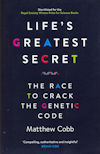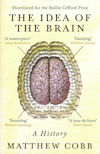In 1943, Erwin Schrödinger introduced the idea of a genetic code and jump-started a new era of research across the world. In Life’s Greatest Secret, Professor Cobb describes how some of the twentieth century’s most outstanding and most eccentric minds collaborated and competed in a race to discover the hidden mechanisms of life. Taking in ideas from computing and cybernetics as well as from physics, chemistry and biology, their research showed that the double helix structure of DNA contained a genetic code and led to the revelation of life’s greatest secret.


